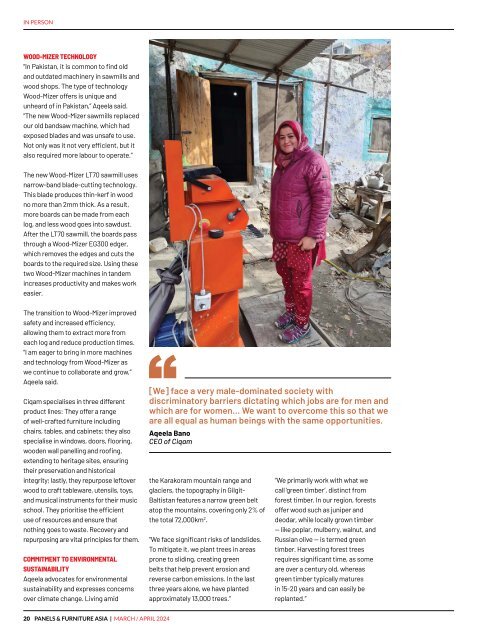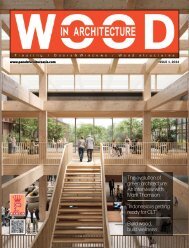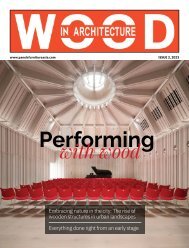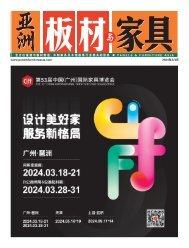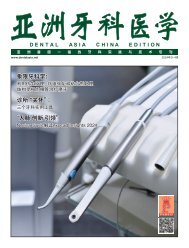Panels & Furniture Asia March/April 2024
Panels & Furniture Asia (PFA) is a leading regional trade magazine dedicated to the woodbased panel, furniture and flooring processing industry. Published bi-monthly since 2000, PFA delivers authentic journalism to cover the latest news, technology, machinery, projects, products and trade events throughout the sector. With a hardcopy and digital readership comprising manufacturers, designers and specifiers, among others, PFA is the platform of choice for connecting brands across the global woodworking landscape.
Panels & Furniture Asia (PFA) is a leading regional trade magazine dedicated to the woodbased panel, furniture and flooring processing industry. Published bi-monthly since 2000, PFA delivers authentic journalism to cover the latest news, technology, machinery, projects, products and trade events throughout the sector. With a hardcopy and digital readership comprising manufacturers, designers and specifiers, among others, PFA is the platform of choice for connecting brands across the global woodworking landscape.
You also want an ePaper? Increase the reach of your titles
YUMPU automatically turns print PDFs into web optimized ePapers that Google loves.
IN PERSON<br />
WOOD-MIZER TECHNOLOGY<br />
“In Pakistan, it is common to find old<br />
and outdated machinery in sawmills and<br />
wood shops. The type of technology<br />
Wood-Mizer offers is unique and<br />
unheard of in Pakistan,” Aqeela said.<br />
“The new Wood-Mizer sawmills replaced<br />
our old bandsaw machine, which had<br />
exposed blades and was unsafe to use.<br />
Not only was it not very efficient, but it<br />
also required more labour to operate.”<br />
The new Wood-Mizer LT70 sawmill uses<br />
narrow-band blade-cutting technology.<br />
This blade produces thin-kerf in wood<br />
no more than 2mm thick. As a result,<br />
more boards can be made from each<br />
log, and less wood goes into sawdust.<br />
After the LT70 sawmill, the boards pass<br />
through a Wood-Mizer EG300 edger,<br />
which removes the edges and cuts the<br />
boards to the required size. Using these<br />
two Wood-Mizer machines in tandem<br />
increases productivity and makes work<br />
easier.<br />
The transition to Wood-Mizer improved<br />
safety and increased efficiency,<br />
allowing them to extract more from<br />
each log and reduce production times.<br />
“I am eager to bring in more machines<br />
and technology from Wood-Mizer as<br />
we continue to collaborate and grow,”<br />
Aqeela said.<br />
Ciqam specialises in three different<br />
product lines: They offer a range<br />
of well-crafted furniture including<br />
chairs, tables, and cabinets; they also<br />
specialise in windows, doors, flooring,<br />
wooden wall panelling and roofing,<br />
extending to heritage sites, ensuring<br />
their preservation and historical<br />
integrity; lastly, they repurpose leftover<br />
wood to craft tableware, utensils, toys,<br />
and musical instruments for their music<br />
school. They prioritise the efficient<br />
use of resources and ensure that<br />
nothing goes to waste. Recovery and<br />
repurposing are vital principles for them.<br />
COMMITMENT TO ENVIRONMENTAL<br />
SUSTAINABILITY<br />
Aqeela advocates for environmental<br />
sustainability and expresses concerns<br />
over climate change. Living amid<br />
[We] face a very male-dominated society with<br />
discriminatory barriers dictating which jobs are for men and<br />
which are for women… We want to overcome this so that we<br />
are all equal as human beings with the same opportunities.<br />
Aqeela Bano<br />
CEO of Ciqam<br />
the Karakoram mountain range and<br />
glaciers, the topography in Gilgit-<br />
Baltistan features a narrow green belt<br />
atop the mountains, covering only 2% of<br />
the total 72,000km 2 .<br />
“We face significant risks of landslides.<br />
To mitigate it, we plant trees in areas<br />
prone to sliding, creating green<br />
belts that help prevent erosion and<br />
reverse carbon emissions. In the last<br />
three years alone, we have planted<br />
approximately 13,000 trees.”<br />
“We primarily work with what we<br />
call ‘green timber’, distinct from<br />
forest timber. In our region, forests<br />
offer wood such as juniper and<br />
deodar, while locally grown timber<br />
— like poplar, mulberry, walnut, and<br />
Russian olive — is termed green<br />
timber. Harvesting forest trees<br />
requires significant time, as some<br />
are over a century old, whereas<br />
green timber typically matures<br />
in 15-20 years and can easily be<br />
replanted.”<br />
20 PANELS & FURNITURE ASIA | MARCH / APRIL <strong>2024</strong>


